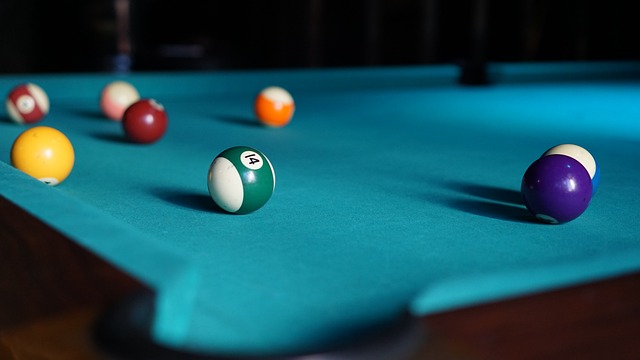Pool tables' weights vary based on slate thickness, material (traditional vs modern), and size. Traditional slates are denser, heavier, and offer better control for advanced players. Lighter slates (450-550 g/sqm) provide speed and agility suitable for beginners. Optimal weight selection enhances play quality, considering skill level, table size, and environment. When asking "How heavy is a pool table?", these factors ensure stability and optimal playing conditions.
Curious about the weight of a pool table’s slate? It’s a critical factor in play quality, influencing shot speed and control. In this article, we dive into the world of pool table construction, exploring materials and weight distribution. We’ll uncover the factors affecting slate weight, from size and thickness to materials used. Learn how to determine the ideal slate weight for your game, ensuring optimal performance every time you hit the table. Discover the answers to “How heavy is a pool table?” and unlock the secrets to achieving true billiard mastery.
- Understanding Pool Table Construction: Materials and Weight Distribution
- Factors Affecting the Weight of a Pool Table Slate
- Weighing the Options: How to Determine the Ideal Slate Weight for Play Quality
Understanding Pool Table Construction: Materials and Weight Distribution

Pool tables are intricate structures that require careful consideration of materials and construction to ensure even weight distribution for optimal play. Understanding this aspect is crucial when seeking to answer the question, “How heavy is a pool table?” The frame, typically made of sturdy wood like maple or oak, serves as the backbone, supporting the substantial top surface known as the slate. This slate, a key component in determining weight, varies in thickness and quality, directly impacting the overall weight.
The weight distribution is further influenced by the cushions and bed lining beneath the slate. These elements work together to provide the smooth, level playing surface essential for billiards. The goal during construction is to maintain equal weight across the table’s surface to prevent warping or uneven play. This meticulous craftsmanship ensures that when you set your cue ball down, it does so on a solid and balanced foundation, contributing to the precision and control required for even the most intricate shots.
Factors Affecting the Weight of a Pool Table Slate

The weight of a pool table slate varies depending on several factors, offering insights into why “how heavy is a pool table?” isn’t a straightforward question. Firstly, consider the size of the slate. Larger tables, with wider playing surfaces, tend to have heavier slates to maintain stability and prevent warping under pressure. The thickness of the slate plays a crucial role as well; thicker slates are generally denser and, therefore, heavier.
Additionally, the material used in manufacturing significantly impacts weight. Traditional slate, known for its durability and smooth playing surface, is denser than some modern alternatives. Glass or composite materials, often used in smaller or lower-end tables, offer a lighter option but may not provide the same level of performance or longevity as natural slate.
Weighing the Options: How to Determine the Ideal Slate Weight for Play Quality

When considering the optimal weight for a pool table’s slate, it’s crucial to understand that this factor significantly impacts play quality. The ideal weight should offer a balance between responsiveness and stability, ensuring smooth shots and accurate ball control. Weighing options typically range from lighter slates suitable for beginners seeking speed and agility, to heavier ones that provide better control and precision for advanced players.
To determine the best slate weight, it’s essential to assess your playing style and skill level. Lighter slates, often between 450 to 550 grams per square meter, are great for those who prefer a faster game with quicker reactions. Heavier slates, ranging from 600 to 750 grams or more, offer increased stability, making them ideal for players who want greater control and a more deliberate approach to their shots. Considering factors like table size, playing environment, and personal preference will help in choosing the perfect slate weight that enhances your pool playing experience.
Pool table slates vary in weight, typically ranging from 870 to 950 grams, with factors like material composition and size influencing this. To ensure optimal play quality, selecting a slate weight that balances stability and responsiveness is key. Understanding these variables allows players and enthusiasts to make informed choices, ensuring their pool table provides years of enjoyable gameplay. Thus, knowing “how heavy is a pool table?” becomes essential for creating the perfect billiards experience.
